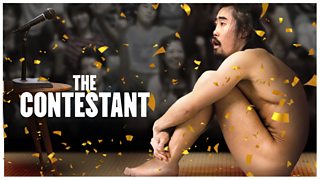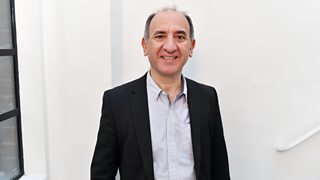Strong Recommend: Six cultural recommendations for the summer
In their ÃÛÑ¿´«Ã½ Radio 4 series Strong Message Here, Armando Iannucci and Helen Lewis can usually be found decoding the baffling language and bizarre terminology surrounding politics and politicians.
But this summer, they're stepping away from the usual Whitehall lingo to offer something a bit different. For their mini-series Strong Message Here: Strong Recommend, they're both picking some cultural highlights to read, see or engage with, paying special attention to recommendations that say something about communication and how we interact with our culture today.
Perfect if the news cycle is getting too much or to get your little grey cells working on your flight or by the pool. Here are a few of their selections of books, films, theatre and TV to get to grips with this summer…

Theatre: Evita at the London Palladium
Andrew Lloyd-Webber’s iconic musical, telling (and singing) the story of Eva Perón returns to London’s West End with an all-star cast including Rachel Zegler of West Side Story and the recent Snow White. But Helen’s pick comes with certain reservations…
“I saw it inside the theatre, which I actually wouldn't recommend because the tickets are very expensive and the connective tissue in the play has been removed,” she says.
As Armando points out: “That’s not a great review so far, is it?”
Erm… no. So, what exactly is Helen recommending?
“The big trick in this production is that Rachel Zeger performs Don't Cry For Me Argentina on the balcony outside the London Palladium. I think it’s about 9pm on weeknight evenings and then obviously the matinee in the afternoon. So if you happen to be in the centre of London, there is essentially a kind of great free show. And it is the banger in the show.”
Hear more of Helen's thoughts on Evita here.
Book: The Bookshop by Penelope Fitzgerald
Shortlisted for the Booker Prize, Armando feels that Penelope Fitzgerald’s 1978 novel might make the perfect beach book and could expand your reading horizons.
“It’s set in East Anglia in the late 1950s. And it's about a woman who has decided she's going to open a bookshop in her town. And then the issues that raises from other people who have their own ideas of what should and shouldn't be in the town,” he says.
“It’s very economically written. Every sentence is razor sharp. It's absolutely loaded with double meaning, with repressed emotion. It's great. I thoroughly recommend it. And it is hoachin’ with commentary on class.”
Don’t worry, there is also a thorough explanation of what the Scottish word ‘hoachin’ means.
Get more book tips from Armando and Helen here.
Book: Every Living Thing by Jason Roberts
Winner of the 2025 Pulitzer Prize for biography, Jason Roberts' book details Carl Linnaeus and Georges-Louis Leclerc’s attempts at taxonomy and the rival personalities of both men. Helen couldn’t put it down.
It's not trying to be epic. It just has a story and gets on with it and does it really well.Armando on The Ballad of Wallis Island
“It's about that kind of 18th century mania for categorising nature. Which I found incredibly interesting,” she says. “But it's also about how much the way we think about the natural world is shaped by Linnaeus.”
“It's very nerdy, but I am very nerdy, and therefore I enjoyed it. So, if you are interested in botany, mad people in the 18th Century or taxonomy…”
Helen also reveals what exactly a ‘titigon’ is.
Listen to more on Helen's book choice here.
Film: The Ballad of Wallis Island
Armando thoroughly enjoyed Tim Key and Tom Basden's hit film which has won many plaudits for its warm and witty portrayal of obsession, nostalgia, music and loneliness.
“It's a really funny, very moving film about memory, about trying to go back to the past, about having to just get on with life as it is now,” he says. “And it’s judged really perfectly.”
But Armando doesn’t just think this is a charming way to kill 90 minutes in the cinema. He believes the film speaks to a much wider issue.
“It struck me that the British film industry, is going through a little bit of an identity crisis. What are we? And films like The Ballad of Wallis Island are one of these small, independent films, with only a very small budget, where it's not about trying to be something other than it is. It's not trying to be epic. It just has a story and gets on with it and does it really well.”
TV: The Contestant
This jaw-dropping Storyville documentary tells the true story of Tomoaki Hamatsu, a Japanese comedian who spent 15 months in a small room, naked, starving and alone, unaware he was being broadcast to millions of people on TV.

Armando was both riveted and appalled.
“The fact that this happened, that a whole country was watching this. I mean, it's beyond The Truman Show. He was going madder and madder.”
Armando also delves into the nature of reality television, which, I think it’s fair to say, he isn’t the biggest fan of.
“The whole business of reality television, I have a problem with because, isn't this using other people for our sport? Isn't this an exploitation? There's a show where you don't know if it's a cake or not. I mean, that's where we've ended up.”
However, Armando reveals what reality show he does love, while Helen tells us all the Japanese word for banana.
Watch The Contestant on ÃÛÑ¿´«Ã½ iPlayer.
Book: Shamanism, The Timeless Religion by Manvir Singh
What is shamanism? Do shamans still exert influence and are they relevant today? In this critically lauded book, anthropologist Manvir Singh investigates shamanism in all its forms and contends that it has far more connections to modern life, and modern spirituality, than we might think. Helen was impressed with his findings…
“Manvir Singh is… really interested in the fact that across lots and lots of cultures, not just traditional cultures, you find shaman-like figures,” she says. “He coins this really good word, which is xenized: making foreign. He talks about the fact that [shamans] make themselves strange and alien. They tend to live apart from the village. And he's really interested in all the ways in which people invoke the supernatural by sort of making themselves other.”
And Helen also thinks there is a possible connection between shamanism and political language.
“I found this book completely fascinating because I think there is a real yearning. There are obviously these deep desires within us for other people to tell us insights. And what are the things about those other people and the way that they speak that make us more likely to listen to them. Totally applies to politics, just as much as it does to your shamans.”





